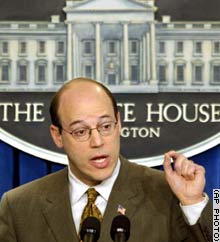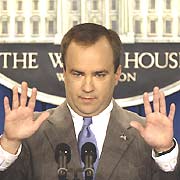Ask Ari Archive
Ask AriScott
February 22, 2006

AriScott, the President has come under a lot of criticism, on national security grounds, for his recent decision to approve the sale of shipping operations at six US ports to a company owned by the government of the United Arab Emirates. Independent of any security concerns, is the President worried about shifting ownership of these assets from private to state control? Is the President concerned that a government-run operation might lead to a decline in the quality of our port services?
Ask AriScott
January 7, 2006

AriScott, does the President feel comfortable about giving a future president in the mold of Bill Clinton the legal right to conduct surveillance of US citizens without a warrant?
AriScott, what actions has the President taken to ensure that gun owners in the United States will not fall into the net cast by the National Security Administration's domestic spying program?
AriScott, what assurances can the President give to gun owners that a future president in the mold of Bill Clinton would not use the NSA's domestic spying program to target them as a group?
Speaking of Scott McClellan
December 5, 2005

If anyone at the White House should resign, it is Press Secretary Scott McClellan. Not for the country's sake, but for his own. After the way he got used by Karl Rove and Scooter Libby early in the Plame Affair, I don't know how he shows up at the office every morning.
Way back on October 7, 2003, at the usual daily press briefing, McClellan answered a reporter's question: "So you're saying -- you're saying categorically those three individuals [Scooter Libby, Karl Rove, and Elliot Abrams] were not the leakers or did not authorize the leaks; is that what you're saying?" with the unambiguous: "That's correct. I've spoken with them."
Well, as it turns out, of course, Libby and Rove were almost certainly among the leakers. But, McClellan can't say anything because there is an ongoing investigation. Of course, there was an ongoing investigation back when he told reporters that he had already eliminated Libby, Rove, and Abrams as suspects. But, never mind.
Since yesterday, I've come across a few more questions for AriScott. The first, via Dan Froomkin's White House Briefing last Friday, is an excerpt from Washington Post national security blogger William Arkin:
...it is the President who insists on labeling Iraq as 'the central front in the global war on terror,' as 'an essential element in the long war against the ideology that breeds international terrorism.' He says that 'the fate of the greater Middle East -- which will have a profound and lasting impact on American security -- hangs in the balance.' I don't buy either of these assumptions, but if the administration is serious in its rhetoric, isn't it strange that they are now saying that they are willing to leave Iraq before the insurgency is 'defeated,' that they are willing to entrust the security of THE UNITED STATES to a brand new, unknown, unproven, untested Iraqi military and police force?
NAM reader JS emailed in a series of questions:
Does the United States intend to sign a formal peace treaty with the Iraqi government elected December 15, 2005? Does the US intend to signal a formal end of hostilities between Iraq and US forces? Does the United States intend to sign a Status of Forces Agreement with the new Iraqi government? If the US is intent on creating a viable, independent Iraqi armed forces, does the US intend to create an Iraqi air force? ...an Iraqi navy oriented to coastal defense? ...supply the Iraqi army with modern tanks?
So, when is someone going to ask Ari, or Scott, or President Bush these kinds of questions? And when is one of those three going to answer?
Ask AriScott
December 4, 2005

I haven't posted any questions for Ari FleischerScott McClellan in a while, so here's fresh batch, a few of my own and a few culled from various sources.
AriScott, the former Prime Minister of Iraq, Ayad Allawi, a strong ally of the United States from the early days of the war in Iraq, recently told the Bristish newspaper The Observer that with respect to the country's human rights situation: "People are doing the same as [in] Saddam's time and worse. It is an appropriate comparison. People are remembering the days of Saddam. These were the precise reasons that we fought Saddam and now we are seeing the same things." Does the President have a different view of the human rights situation in Iraq and, if so, what information does he have that former Prime Minister Allawi does not? Does it worry the President that influential US allies in Iraq see no progress there almost three years after the invasion?
AriScott, on November 22, Shiite, Sunni, and Kurdish leaders, including Iraqi president Jalal Talabani, called for "the withdrawal of foreign troops according to a timetable". If the Iraqi government elected democratically on December 15 asks for an immediate or phased withdrawal of US troops, or the establishment of a timetable for withdrawal, will the United States comply with such a request?
AriScott, in that same meeting, Shiite, Sunni, and Kurdish leaders condemned terrorist attacks against "Iraqi citizens and humanitarian, civil, government institutions, national resources and houses of worships", but recognized "a legitimate right for all people" of "resistance", which appears to legitimate attacks against US forces deployed in Iraq. Is the President concerned that the consensus view of Iraqi leaders, many of whom will play an important role in the elected government, is that their fellow citizens have a "legitimate right" to attack our troops in their country?
Jeffrey K. Tulis, a professor in the Department of Government at the University of Texas at Austin, asks the following on the Nieman Watchdog site:
Q. President Bush is in the midst of a political campaign in which he is taking his case for Social Security to the American people. But as he tours the nation, he is only addressing carefully screened audiences of supporters. Those audiences do not include citizens who are representative of the diverse array of views in the country. How does the practice of limiting audiences of ordinary citizens to those who share his party affiliation or who already support his policies improve our constitutional democracy?
Q. Some political observers think recent presidents, in contrast to earlier presidents, have erased the distinction between campaigning and governing. Does Bush agree that governing has become a permanent campaign and if so, is it good to govern this way? If not, what does he think are the most important differences between campaigning and governing?
Q. Bush recently criticized President Vladimir Putin of Russia for his failure to advance "universal principles" such as a "free press and viable political opposition." Would he be more credible in calling for more robust forms of democracy abroad if he demonstrated his own commitment at home by engaging in real political discussion and welcoming challenging questions in his efforts to advance a domestic agenda?
A reader over at Josh Marshall's Talking Points Memo wants to know:
So, the President is going to announce the beginning of a pull out from Iraq. Where does that leave the so-called flypaper strategy? President Bush has repeatedly justified the Iraq war by claiming: "We're taking the fight to the terrorists abroad so we do not have to face them here at home" and "We either deal with terrorism and this extremism abroad, or we deal with it when it comes to us."
If we are getting out of Iraq, does that mean that he believes that the terrorists there have been eliminated? Or, has he decided to bring the fight back home to the United States? Or, is he hoping that the new Iraqi government and army will defend the United States from terrorism?
Ask AriThe President
September 13, 2005
Dan Froomkin, whose White House Briefing provides the best coverage of the White House period, offers four questions for President Bush's next press conference.
* Sir, what were your personal feelings when you first grasped the enormity of what had happened along the Gulf Coast? And about when was that?
* Sir, apparently many African Americans believe that the federal government was slow in rescuing people stranded in New Orleans because many of those people were black and poor. I know you've denied that was the case, but do you understand why they might feel that way?
...
* Sir, you've said countless times that you don't govern based on the polls. But can you explain the polls? You are not a popular president anymore. How do you think that happened?
* Sir, it is increasingly said that you operate in a bubble, sealing yourself away from dissenting voices, and on those rare occasions that people tell you bad news, you yell at them. Doesn't that make it harder for you to make intelligent decisions?
Ask AriScott
September 10, 2005

Reporter: Given the recruitment shortfalls facing much of the Armed Forces, and given the President's own positive experience with the National Guard during the Vietnam War, has the President encouraged his two adult children to enroll in the Armed Forces or the National Guard?